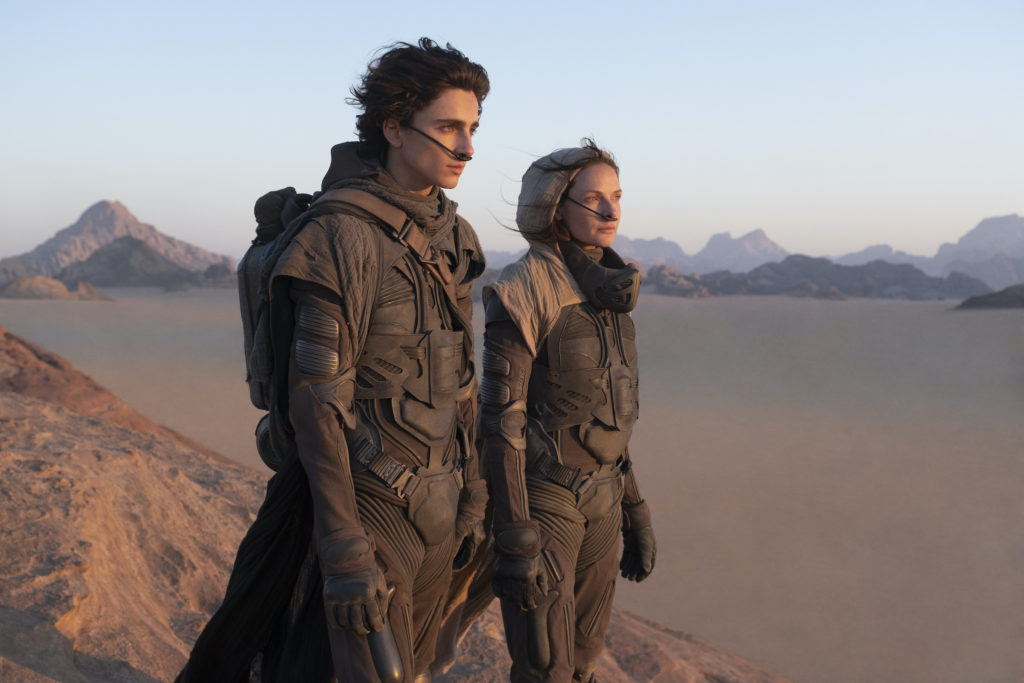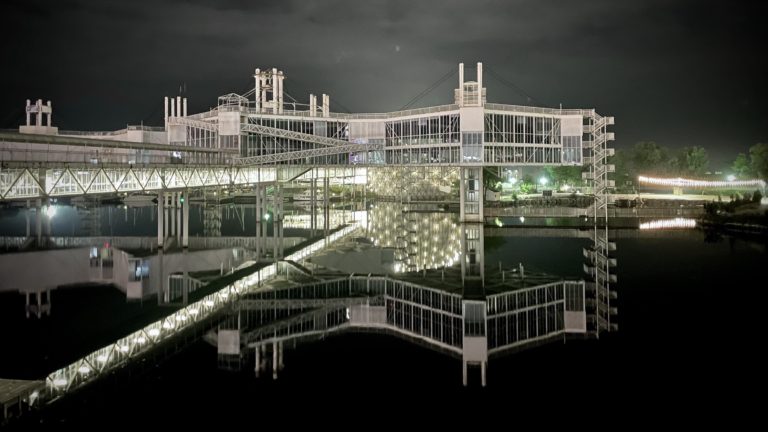Dune: Part One (2021 | USA | 155 minutes | Denis Villeneuve)
You might say Dennis Villeneuve’s adaptation of Frank Herbert’s novel plays like ponderous messianic nonsense and write an obituary for blockbusters when you stream Dune next month on HBOmax, but you haven’t really lived until you’ve watched Timothée Chalamet projected 100 feet tall, popping his head out of a sand dune like a floppy-haired prairie dog. Sure, Dune has it’s premiere-premiere in Venice last week, but WB granted Toronto the honors for hosting the film’s international IMAX premiere this weekend at the Cinesphere, an illuminated globe accessible by footbridge on an island on the city’s Lake Ontario shoreline. It was a suitable setting to be won over by a flawed first chapter in a heady space epic.
Introducing his film to audience of adoring fans, Villeneuve gestured to the immense screen and said “when we made this movie my cinematographer [Greig Fraser] and I dreamed about that.” During the two and a half hour runtime, I lost track of many things, including more than a few nuances of the plot, but it did seem like well over half of took full advantage of the format’s 1.43:1 ratio to fill the gigantic screen. If nothing else, from the outstanding photography to the coolly grounded production design (a reunion with Arrival‘s Patrice Vermette), impeccable costumes (Jacqueline West, who really should roll-out a line of masks for the fall season), and another Hans Zimmer auditory overload score, it is a truly spectacular experience.

Dune is set in a multi-planetary empire where powerful families vie for control of a sand-covered planet called Arrakis for the “spice” that clouds its atmosphere and turns colors the eyes of its long-term inhabitants blue. These grains are precious to the locals as a hallucinogen and to the galaxy writ large as the key to interstellar travel (weird, right? the place is also crawling with giant terrifying sandworms). Much to the chagrin of the indigenous people (“the Fremen”), the planet’s export and refinement concerns have been mercilessly lorded over by the evil bald goths of House Harkonnen (led by Stellan Skarsgård in bulbous prosthetics, Dave Bautista in exactly his usual lane as his warrior nephew, and David Dastmalchian in club gear as his fey assistant) for decades. After years of guerrilla resistance, the Emperor orders a change of stewardship. Not to the people who’ve lived there forever, but to yet another family: House Atreides, the nice and attractive ones.
There is; however, the infamous matter of adapting the plot. If not for the big screen ambitions, it seems like the saga might have been better suited for at least a limited series if not a multi-year prestige drama. Still, coming into the screening having never cracked open the novels or even attempting David Lynch’s 1984 attempt, I was surprised how easy I was able to follow the broad strokes so long as I didn’t resisted getting annoyed or mired in the plot’s whispery details.
The story has a tremendous amount of business to convey, but if you’re willing to put up with some murk, Villeneuve’s organic approach to parceling out information and backstory basically works. He centers our affinities with young House Atreides heir Paul (Timothée Chalamet). We meet him as he wakes up from what will be one of many vivid dreams of Zendaya to sleepily have breakfast with his mother (Rebecca Ferguson). Introducing an element of magic in this universe, she makes him practice his “commanding voice” to request a simple glass of water to go with his food. We get a sense of the sweep and ceremony of the empire when a massive delegation arrives on their planet to turn over control of Arrakis to Paul’s dad Leto (Oscar Isaac, with a phenomenal beard) in a highly expensive bit of space-traveling formality. Later, through sparring matches with an advisor played by Josh Brolin and a reunion with Jason Momoa as an elite military commander, we get a sense of how widely Paul is loved and admired through the kingdom.
This planetary change of leadership and massive organizational challenge should seem suspicious to anyone, but the noble and fair-minded Leto Atreides is willing to pack up his whole family and leave their beautifully hydrated and mountainous home for the opportunity to bring a kinder, gentler, more respectful approach to ruling. It’s also chance to serve and profit while forging an alliance with the Fremen that will augment their complete their sea and space dominance to a trifecta that includes “desert power”.
As if these politics aren’t complicated enough, we soon learn of a yet another piece to this complex puzzle in the form of an order of witchy nuns who have been orchestrating a shadow power play over thousands of years of selective influence. You’ll never guess who might be their long-awaited Chosen One, with a mind that can reach through time and space. (Or rather, you won’t need to guess, because the answer is dreamy and obvious.)
By the time the Atreides clan gets to Arrakis, there’s already been a huge amount of table-setting and there’s even more to come, but at least it’s an incredible banquet. Chalamet has the on-camera magnetism to hold the Chosen One role and the sprawling supporting cast makes for a compelling coterie. Each new character conveys a sense of this universe’s labyrinthine underlying complexity without becoming fully overburdening. Villeneuve realizes the various settings with cool tech like buzzing dragonfly aircraft that skitter across the hostile desert, personal shielding devices that glimmer with every strike, and a veritable runway collection of chic functional fashion. The film’s setpieces are visually rich and surprisingly comprehensible — from huge battles to aerial escapes — and he successfully depicts toothy orifices of those famous sandworms as sources of immense ever-present danger that are worthy of reverence.
It’s a film that could (will) frustrate for being shallow, overstuffed with mythology, schemes, and double-crosses. As a warning that this film is a prelude to the real story and that some of the action will be left unresolved, Villeneuve punts from the jump, subtitling this installation Dune: Part One and peppers it with visions (or previews) of coming attractions. Even in an age of franchises, the decision is either a bold move or a cop-out considering that a subsequent installation hasn’t yet filmed let alone greenlit. Whether the gambit pays off may depend on box office (or HBOmax subscribers), but I suppose that you have to appreciate the swagger. For all the squabbles based on release strategies, I tend to agree with Villeneuve that this will benefit substantially from being seen on the largest screen you can find.
I can’t say that I’m deeply invested in the fate of young Paul Atreides, per se, but I thoroughly enjoyed spending time in this rich universe. For that reason alone, I do hope that we eventually get to see the conclusion of his journey, if only for more enduring images like that of a resilient mother and son sand-dancing into an uncertain future across the perilous open desert under a night sky lit by twin moons. Those will stick with me, regardless of a sequel, but it would still be nice to find out what’s up with Rebecca Ferguson’s witchy conspiracies and to see how she and Zendaya get along once she gets a proper leading role.
Dune arrives in theaters and on HBOmax on October 22



